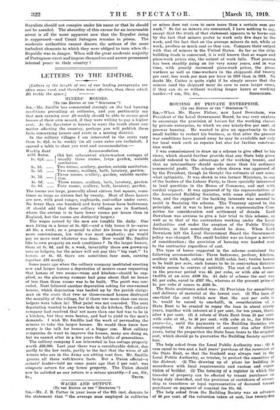LETTERS TO THE EDITOR.
[Letters of the length of one of our leading paragropha are often more read, and therefore more effective, than those which fill treble the space.] -- MINERS' HOUSES.
[To sus Eorroa or THE " SPECTSTOS."]
Smillie has commented strongly on the bad housing conditions prevailing at collieries, and you pertinently say that men earning over 43 weekly should be able to secure good bosses of their own accord, if they were willing to pay a higher rent. As the Spectator is known to want the truth about any matter affecting the country, perhaps you will publish these facts concerning houses and rents in a mining district.
In the colliery villages I am interested in the rents vary from Is. Gid. to Gs. weekly (in all cases rates are included). I append a table to show you rent and accommodation:—
Weekly Rent .4ccommodation.
with Rater. Old but substantial white-washed cottages of ls. Gid. { usually three rooms, large garden, outside sanitation.
3s. 9d. Two rooms, scullery, garden, outside sanitation.
3s. 5d. Two rooms, scullery, bath, lavatory, garden.
I Three rooms, scullery, garden, outside sanita-
as. 7d. 1 tion.
4s. Gd. Three rooms, scullery, bath, lavatory, garden.
Gs. Od. Four rooms, scullery, bath, lavatory, garden.
The rooms are large, generally about sixteen feet square, some- times as large as sixteen feet by twenty. Most of these houses are new, with good ranges, cupboards, coal-collar under cover. No fewer than one hundred and forty houses have bathrooms. (I should add that these colliery villages are in Scotland, where the custom is to have fewer rooms per house than in England, but the rooms are distinctly larger.)
The wages earned by the men are roughly 15s. daily. One man living in a house at is. 61jr1.—and a tidy house it is—earns £4 105. a week; on a proposal to alter his house to give some more conveniences, his wife was most emphatic; she would pay no more rent whatever was done. How would Mr. Smillie like to own property on such conditions P In the larger houses, those at 4s. 6d. and 6s. a week, invariably there are grown-up sons or lodgers, for the miner will not pay this " big rent." In houses at 45. Gd. there are sometimes four men, earning together £16 weekly.
Some years ago when the colliery company meditated erecting new and larger houses a deputation of miners came requesting that houses of two rooms—room and kitchen—should be sup- plied, as the alarming rumour had gone about that no house of less than three rooms was to be built The point was con- ceded. Next followed another deputation asking for one-roomed houses, which deputation sees backed up by the parish clergy- man on the score that two- or three-roomed houses destroyed the morality of the village, for if there was more than one room lodgers were taken in! That point was not conceded. The next deputation wanted to have two beds in the kitchen. The colliery company had resolved that not more than one bed was to be in a kitchen, but they were beaten, and had to yield to the men's demands. I wish Mr. Smillie had the work of persuading the miners to take the larger houses. He would then know how empty is the talk for houses of a bigger size. Most colliery companies do want to improve the houses, many are doing so, but we cannot alter in a few years the habits of generations. The colliery company I am interested in has cottage property worth £60,000. Last year there was a considerable deficit, due partly to the low rents, partly to the fact that the wives of all miners who are in the Army are eitting rent free. Mr. Smillie gnores all these well-known facts. But a Union official—a miners' leader—told me some years ago that 1 per cent. was adequate return for any house property. The Union should now be satisfied as our return is a minus quantity.—I am, Sir,
Tama.






































 Previous page
Previous page